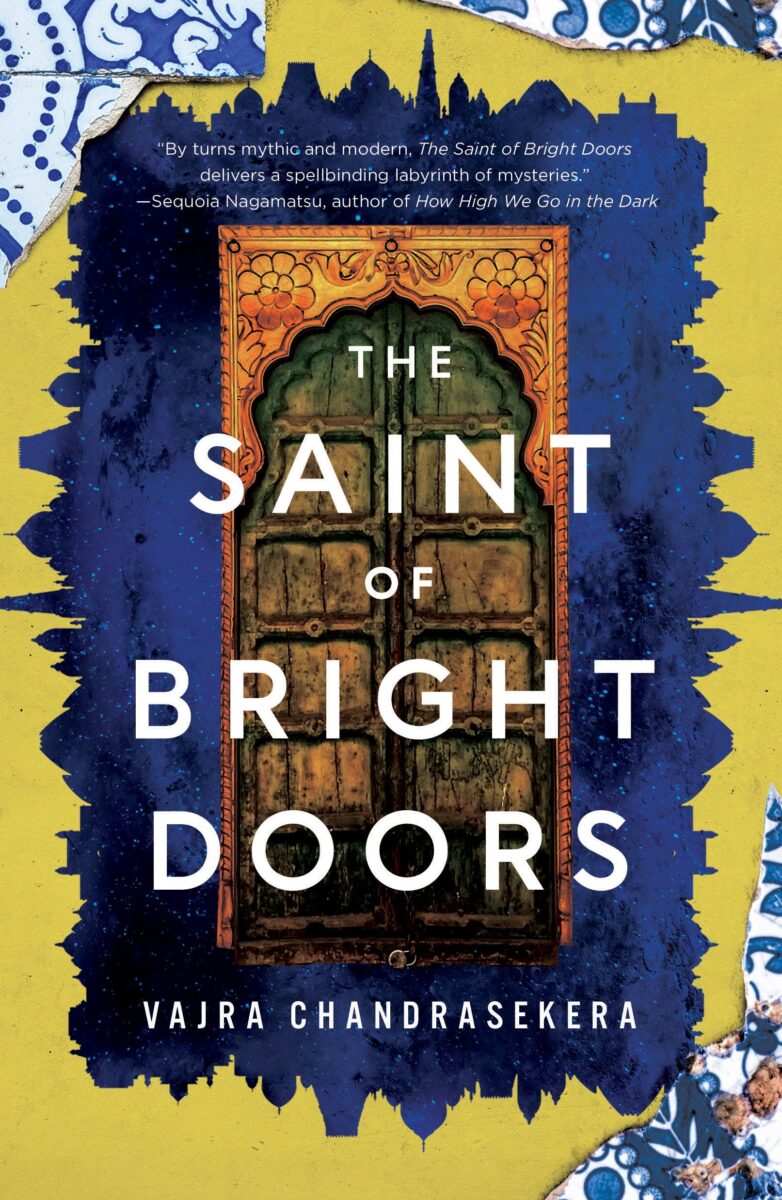If you only take one thing from my review, it’s this: I love this book so much. So much. It is so good. It’s going to have a permanent place on my top shelf, only I’m sure it will actually live in a small pile of beloved books much closer to hand, getting its pages dogeared and its spine warped.
The Saint of Bright Doors by Vajra Chandrasekera has everything: palpably vivid worldbuilding! Cutting political insight! Quietly wry humor! Propulsive multi-threaded narrative! Knockout prose! Complex and compelling characters, even the minor ones! I usually limit how many exclamation points I use in one review, but I can’t help myself!

The novel follows Fetter, a man somewhat adrift in the city of Luriat. He tethers himself to his community by offering assistance to newer immigrants and refugees to the city, but his deeper longings are still confused: what does he want, himself? It’s hard to tease out his personal desires from those of his psychotically overbearing mother, a woman who shaped him from birth into an assassin. He was meant to be her weapon for destroying his own father, a saint of dubious intentions, but he chose to leave that life behind. Now he spends time with other un-Chosen Ones in a support group, and tries to accept things as they come.
But what do you accept in a city rife with corruption, random violence, and deep economic disparity, and what do you work to change? Fetter is enticed by the opportunity to improve his chosen home, especially because it comes with the chance to learn more about Luriat’s bright doors. The doors are both mysterious and slyly mundane, seeming to be nothing more than ordinary—if slightly ostentatious—architectural fixtures. Why they suddenly appear, though, and what they open into, is unknown. Fetter may be uniquely equipped to discover what the bright doors really are, and in so doing understand a much deeper truth about Luriat itself.
Luriat has elements of New Crobuzon from China Miéville’s novels, an urban wilderness both gritty and gleaming, a bit of order in its chaos and vice versa. But it also has—and hear me out—a bit of Haruki Murakami’s Tokyo, not just because there are unexpected alleys and sudden corners that slip into the surreal, but also because the way that Fetter goes about exploring. He’s one of those characters who, though he definitely has agency, tends to have things happen to him. The city acts upon him, not quite a character and not quite a phenomenon, but definitely not just a setting.
This largely works very well. The city acts through its various avatars, and Fetter responds, and we get to explore Chandrasekera’s incredible world from many different vantages.
What Works: the worldbuilding, the humor, the prose, the characters
What Doesn’t: Unevenness in the final act
Recommended Listening: Doesn’t matter, you’ll be too immersed to notice

The Kafkaesque section during which Fetter is imprisoned in the camps is a bit wearying. I can’t exactly fault Chandrasekera for so accurately conveying both Fetter’s personal depression and the sense of frustration and despair so omnipresent among the political prisoners, refugees, and other unlucky souls trapped in an intentionally opaque system. It has the sense of a map the size of a country, except that it’s a bureaucracy the size of a state. The camps feel bigger than Luriat itself, complete with their own districts and administrative centers—a city not within a city, but perpetually outside of a city. Still, because Fetter has no clear overarching goal—is he still looking for ways to kill his father? Is he looking for a different paradigm than either accepting or resisting the one his mother gave him?—it becomes a little sloggy. Which may itself be the point, metaphorically speaking, but it does still bog down the narrative a bit.
Things pick up when Fetter begins to embrace his powers, but confusion does seep in again as Chandrasekera switches to an unexpected new POV (although the groundwork was definitely laid for the change—pay attention to those not-actually-typo shifts to the first person!) in order to wrap up the story a bit too quickly. Part of this is objection, though, I freely admit might be me not knowing or misunderstanding some of the themes in play—I don’t know enough about Sri Lankan culture and history, and I may be misinterpreting how I should be reading. But it’s a quibble, and it shouldn’t deter you from reading The Saint of Bright Doors; it’s just a caveat that the ending may not be what you expect in terms of the narrative cadences you’re used to. Fans of Robert Jackson Bennett and Daniel O’Malley will love the magnificent worldbuilding and sociopolitical insightfulness. And the existential insightfulness. The Saint of Bright Doors asks really, really big questions about time, and who gets to control myth, and what myth actually accomplishes in the world. When stories and interpretations compete for ascendancy, where do the losing ones go? What is the fate of all the failed Chosen Ones, and all the utopias or apocalypses they were supposed to usher in? Their stories don’t get told—but here in Luriat and in The Saint of Bright Doors, they finally do.
The Saint of Bright Doors comes out July 11, 2023.
